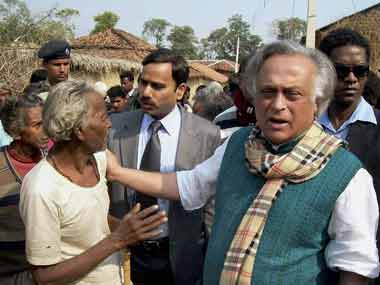Crude generalisations may make for great polemics, particularly when they are backed by ideological rigidity, but they don’t always make for informed political or economic discourse.
Rural development minister Jairam Ramesh is guilty of both crude generalisations and ideological rigidity when he says, with breezy disregard for nuance and even a callous disdain for facts, that “mining only leads to poverty.” Addressing tribal populations in Lanjigarh in Odisha, Ramesh claimed that mining would not do away with the widespread poverty that the tribal-inhabited areas in the State were susceptible to. “The Central government believes that poverty can be reduced only through agriculture and rural development,” Ramesh added. (More here)
Ramesh’s choice of turf to articulate his ruminations on mining, poverty and rural development isn’t entirely without significance. This was after all the ‘hallowed’ ground where Rahul Gandhi had in 2010 given rare voice to his perspective (such as it is on) on developmental economics - with yet more of the same crude and ill-informed generalisations.
[caption id=“attachment_587524” align=“alignleft” width=“380”]  Friend of the tribals or just misguided? PTI[/caption]
Rahul Gandhi had said then that he would serve as a “soldier in Delhi” waging battle on behalf of the tribal people of Kalahandi and against the interests of mining corporates that were looking to harness minerals from this resource-rich region. Ramesh had, as Environment Minister, refused clearance for mining activity in the region, as part of an elaborate mapping of go/no-go areas that clearly went overboard in its reach.
As columnist Dhiraj Nayyar noted last year, that decision by Ramesh cost the country substantially more than the Rs 1.86 lakh crore that was cited by the Comptroller and Auditor-General as the notional loss to the exchequer from the coal scandal.
Impact Shorts
More ShortsThe Indian economy paid a high price in terms of the 10-15 per cent shortage in power supply year after year, added Nayyar. And that shortage came about not because power generating capacity had not been added, but because of a crippling shortage of coal to fire the power plants. And over the next five years, that shortage will likely more than double.
In other words, what keeps the tribal people of Odisha’s mineral-rich area in poverty is not mining activity but the singular lack of imagination of successive governments, right down to the UPA 2 government of Manmohan Singh, to bring even the rudiments of development to these region. It bears mention that Odisha’s Kalahandi district was in the news during Rajiv Gandhi’s prime ministership in 1986 for the starvation deaths there that prompted a tribal mother to sell her daughter for food. Until then, the Congress had been in power at the Centre for all but three years - and yet, the tribal communities had not benefited from even the faintest whiff of development and continued to wallow in poverty.
Even today, the UPA government’s anti-poverty measures only find expression in throwing good money after bad on welfare programmes that leak like a sieve, rather than in permitting responsible mining activity that would have propelled the economy and uplifted local populations from poverty while simultaneously limiting environmental degradation.
Successful models overseas offer an illustration of the economic multiplier effect, including in lifting indigenous populations from poverty, from responsible mining overseen by proactive governments. In Australia, for instance, the mining boom during the past decade effectively meant that the contribution of mining and mining services industries to Australia’s economy more than doubled from less than 10 per cent of GDP in 2002-03 to 20 per cent of GDP in 2011-12. (More here)
The Australian government also oversaw a partnership between the minerals industry and the indigenous communities, including Aboriginal communities, under which the industry expanded accesss to employment and business development opportunities to indigenous people and communities in mining regions.
In other words, the federal government worked alongside the minerals industry, yet held it accountable for responsible mining practices, and simultaneously leveraged the industry to catalyse the economy in rural and remote parts of Australia both directly through employment and enterprise development, and indirectly by supporting broader economic opportunities.
Similar successful models of responsible mining that uplifted economies exist in other resource-rich countries, including Mongolia. Entire communities benefited from the mining boom, with no significant damage to the environment.
In India, on the other hand, polemicists like Jairam Ramesh and Rahul Gandhi have made a virtue of economic stagnation for decades, in the name of protecting tribal communities from mining corporates. And having contributed thus to a crippling loss of coal for power generation, inflicting a heavy economic burden on the economy, the Manmohan Singh government gave away mining licences recklessly precipitating what is arguably the biggest resources scam in India’s independent history. Today, the selfsame Jairam Ramesh suggests with no trace of irony that it is mining that keeps tribal communities in poverty.
No, Mr Ramesh, what keeps tribal communities in poverty is your ecological evangelism (which acknowledges no middle ground) - and your government’s laissez faire grant of licence that feeds monumental corruption - rather than promote responsible mining that can lift up economies and benefit everyone, including tribal populations, without environmental degradation. It is the singular lack of imagination on the part of the government of which you are a part that has inhibited the Indian economy from realizing its potential and allowed the plunder of national resources, while keeping tribal communities in poverty.


)

)
)
)
)
)
)
)
)



